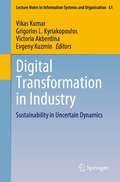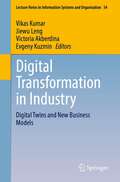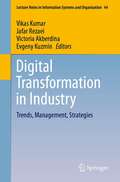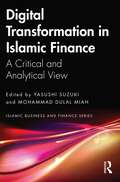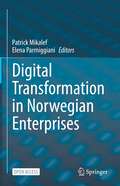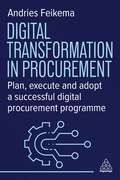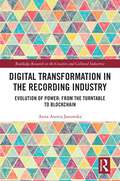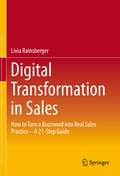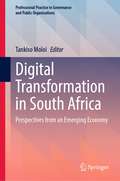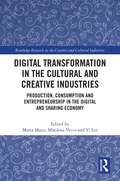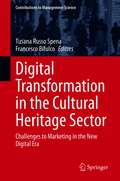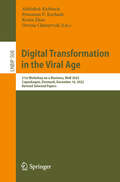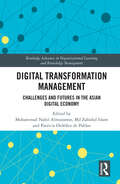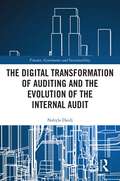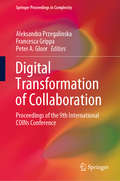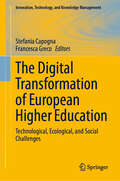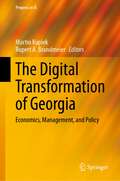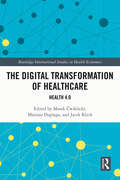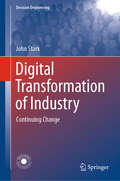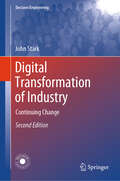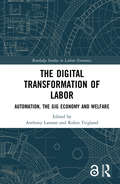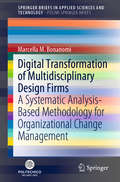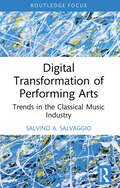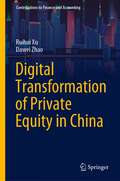- Table View
- List View
Digital Transformation in Industry: Sustainability in Uncertain Dynamics (Lecture Notes in Information Systems and Organisation #61)
by Vikas Kumar Grigorios L. Kyriakopoulos Victoria Akberdina Evgeny KuzminThis book offers a selection of the best papers presented at the annual international scientific conference “Digital Transformation in Industry: Trends, Management, Strategies,” which was held by the Institute of Economics of the Ural Branch of the Russian Academy of Sciences (Ekaterinburg, Russia) on October 28, 2022.The book focuses on concepts for initiating digitalization processes and identifying successful digital transformation strategies in all sectors of industry. Key topics include the sustainability of digital transformation in uncertain dynamics; conditions of uncertainty and barriers; industrial logistics in the new reality; best practices for implementing digital solutions to ensure sustainable, barrier-free and flexible supply chains; the achievement of sustainability in the process of digital transition; the adaptation of enterprises to the ESG concept through digital solutions; assessing the impact of industrial digital transformation on society and the environment; and clarifying how ESG aspects affect the economy. The experiences of various countries, regions and types of enterprise implementing IT and other technological innovations are also included, making the book a valuable asset for researchers and managers alike.
Digital Transformation in Industry: Digital Twins and New Business Models (Lecture Notes in Information Systems and Organisation #54)
by Vikas Kumar Jiewu Leng Victoria Akberdina Evgeny KuzminThis book offers a selection of the best papers presented at the annual international scientific conference “Digital Transformation in Industry: Trends, Management, Strategies (DTI2021),” held by the Institute of Economics, Ural Branch of the Russian Academy of Sciences, in Ekaterinburg (Russia) on October 29, 2021. The book focuses on the idea of introduction mechanisms for digitization processes and on highlighting successful digital transformation strategies in all sectors of industry. Key topics include the development of a cyber-physical production system for Industry 4.0; digital design technologies for enhancing the competitiveness of products and companies; digital twin-driven product manufacturing and services; and the effects of the industrial digital transformation on society and the environment. With regard to implementing IT and other technological innovations, lessons learned in developed and developing economies, as well as small and large enterprises, are included. Given its scope, the book offers a valuable asset for researchers and managers of industrial organizations alike.
Digital Transformation in Industry: Trends, Management, Strategies (Lecture Notes in Information Systems and Organisation #44)
by Vikas Kumar Jafar Rezaei Victoria Akberdina Evgeny KuzminThis book offers a selection of the best papers presented at the international scientific conference "Digital Transformation in Industry: Trends, Management, Strategies", held by the Institute of Economics of the Ural Branch of the Russian Academy of Sciences, Russia in November 2020. The main focus of the book is to evaluate trends and perspectives of digital transformation in industry and industrial markets through the dissemination of Industry 4.0. The aim of the topics discussed is to create an idea of introduction mechanisms for digitization processes and to specify successful strategies of digital transformation in all sectors of industrial enterprises. The experience of developed and developing economies, as well as small and large enterprises implementing IT and other technological innovations are included. Students as well as managers of industrial organizations alike can benefit from the results of the topics covered.
Digital Transformation in Islamic Finance: A Critical and Analytical View (Islamic Business and Finance Series)
by Yasushi Suzuki Mohammad Dulal MiahThe ongoing digital transformation is shaping the Islamic mode of financial intermediation and the impact on the faith-based financial mode has been multifaceted. This has raised a host of interesting questions: what is the degree of penetration of Islamic finance in the fintech industry? Are Islamic financial institutions (IFIs) or banks ready to embrace fintech? Is fintech an enabler or barrier to achieve the intended purpose of Islamic finance? Will technology narrow the division between Islamic and conventional finance in the future? These are existential questions for Islamic finance and the book endeavors to examine the impact of financial technology on the industry. The book assesses various fintech business models and how they could be a threat or an opportunity. It also examines whether fintech provides IFIs an edge to serve clients following the Shariah norms and how the adoption of fintech in the Islamic mode is required for meeting the maqasid Al Shariah. The book discusses applicability of fintech like blockchain, digital currency, big data, and AI to different branches of Islamic finance. This book will interest students, analysts, policymakers, and regulators who are working on Islamic finance, financial economics, Islamic economics, and development finance.
Digital Transformation in Norwegian Enterprises
by Patrick Mikalef Elena ParmiggianiThis open access book presents a number of case studies on digital transformation in Norway, one of the fore-runners in the digital progress index established by the European Commission in 2020. They explore the process of adoption, diffusion and value generation from digital technologies, and how the use of different digital solutions has enabled Norwegian enterprises to digitally transform their operations and business models.The book starts with an introductory chapter summarizing a vast body of literature in order to synthesize what is already known about digital transformation before exploring the Norwegian context in more detail. Then a series of case studies from the private and public sector in Norway is presented. They document a process perspective which describes the sequence of events during and after adoption of digital solutions, as well as the types of business value that were realized. Through these single studies, the process of digital transformation is illustrated, a number of key findings highlighted, and eventually theoretical and practical recommendations based on these cases emphasized. The book closes with a brief overview of some emerging technologies, and comments on how they are likely to change different sectors. Digital transformation has been one of the priority areas for the Norwegian government over the past years and puts Norwegian enterprises upfront in adopting novel technologies and utilizing them for achieving organizational goals. This experience accumulated over the years makes the Norwegian context a particularly interesting one in understanding how private and public organizations make use of new digital solutions, what lessons can be learnt during the process, and what are some of the key success and failure factors. This way the book is written for practitioners who are currently involved in digital transformation projects in their organizations, researchers of information systems and management, as well as master students in degrees of informatics and technology management.
Digital Transformation in Procurement: Plan, Execute and Adopt a Successful Digital Procurement Programme
by Andries FeikemaWith digitalization a consistent theme on every procurement leader's agenda, this book provides a practical approach, empowering leaders to skilfully navigate the intricacies of digital transformation in procurement. Many procurement leaders struggle to deliver their digitalization agendas due to slow, costly and underwhelming results. Digital Transformation in Procurement is designed to help procurement leaders embrace digital transformation and drive top-line growth. Covering the essential success factors, the impact of digitalization on people, organization processes and technology, this book helps leaders in procurement make any digitalization transformation a success and deliver value at scale. Digital Transformation in Procurement is a practical resource offering valuable insights, frameworks and examples from global procurement transformation programmes. Taking a holistic approach to digital transformation, this book covers key challenges, new technologies and how procurement leaders can make digitization work for them. This is the book every procurement leader needs to launch their new procurement strategy for the digital age.
Digital Transformation in The Recording Industry: Evolution of Power: From The Turntable To Blockchain (Routledge Research in the Creative and Cultural Industries)
by Anna Anetta JanowskaThe recording industry has famously been transformed by technology throughout its entire history.The book presents an analysis of these changes using Porter's five forces model. The author highlights the evolution of buyers' and suppliers' power, the emergence of new competitors, product innovation and rivalry between companies in the industry driven by economic, political, social and legal factors.As an early mover in the social diffusion of copyright-sensitive content, the recording industry reflected in this book serves as an important reference for the analysis of other cultural and creative sectors.
Digital Transformation in Sales: How to Turn a Buzzword into Real Sales Practice – A 21-Step Guide
by Livia RainsbergerThis book is a practical guide to the digital transformation of sales organizations. In 21 steps, it provides an overview of the state of the art of technologies and digital sales tools and creates an understanding of what the digitization of sales is really about. The primary driver of digitization is the modern customer, and it is important to always keep him in mind throughout the entire sales strategy. The sole use of technologies and the pure digitization of processes are not enough to make an organization fit for the challenges of the modern business world. All tools and processes from positioning to customer management are explained in detail in this book and illustrated with concrete examples. What do chatbots do, what are virtual and augmented reality suitable for, and what is the benefit of rapid prototyping? Which sales activities can be supported by digitalization? The author provides answers to these and many other questions and shows how sales managers can make themselves fit for the future. With concrete tips and numerous implementation aids.
Digital Transformation in South Africa: Perspectives from an Emerging Economy (Professional Practice in Governance and Public Organizations)
by Tankiso MoloiThis book examines the adoption of digital technologies in different sectors in South Africa. The authors investigate how digital innovation impacts development in various areas in the public and private sectors. Chapters in the book cover digital transformation in authorities and government bodies and how this transforms governance, this includes digital transformation for good governance in the public sector, tax authorities, local government, and traditional authorities. The second set of chapters emphasizes the digital transformation of business corporations, such as digital transformation lessons for small businesses, digital transformation of finance, and the banking sector. Other chapters delve into enterprise processes such as auditing, corporate reporting, good corporate reputation, enterprise risk management, and marketing environment. The book will appeal to an audience of scholars and professionals wanting to understand more about the role of digital transformation in emerging economies and how innovation influences economic growth.
Digital Transformation in the Cultural and Creative Industries: Production, Consumption and Entrepreneurship in the Digital and Sharing Economy (Routledge Research in the Creative and Cultural Industries)
by Marta Massi, Marilena Vecco and Yi LinThis research-based book investigates the effects of digital transformation on the cultural and creative sectors. Through cases and examples, the book examines how artists and art institutions are facing the challenges posed by digital transformation, highlighting both positive and negative effects of the phenomenon. With contributions from an international range of scholars, the book examines how digital transformation is changing the way the arts are produced and consumed. As relative late adopters of digital technologies, the arts organizations are shown to be struggling to adapt, as issues of authenticity, legitimacy, control, trust, and co-creation arise. Leveraging a variety of research approaches, the book identifies managerial implications to render a collection that is valuable reading for scholars involved with arts and culture management, the creative industries and digital transformation more broadly.
Digital Transformation in the Cultural Heritage Sector: Challenges to Marketing in the New Digital Era (Contributions to Management Science)
by Tiziana Russo Spena Francesco BifulcoThis book devises an alternative conceptual framework to understand digital transformation in the cultural heritage sector. It achieves this by placing a high importance on the role of technology in the strategic process of modeling and developing cultural services in the digital era. The focus is on how marketing activities and customer processes are being transformed by digital technologies to create better value, which can also be communicated to customers through an engaged and personalized approach. Much of the digital debate in cultural heritage is still in infancy. Some existing studies are anecdotal and often developed within the domain of established research streams, including studies with some technological aspects addressed partially and from an episodic or periodic perspective. Moreover, the critical changes that have emerged in the cultural management landscape are yet to be highlighted. This book fills that gap and provides a perspective on the cultural heritage sector, which uses the new social and technology landscape to describe the digital transformation in cultural heritage sectors. The authors highlight an inclusive perspective that addresses marketing strategy in the digital era as a proactive, technology-enabled process by which firms collaborate with customers to jointly create, communicate, deliver, and sustain experience and value co-creation.
Digital Transformation in the Recording Industry: Evolution of Power: From The Turntable To Blockchain (Routledge Research in the Creative and Cultural Industries)
by Anna Anetta JanowskaThe recording industry has famously been transformed by technology throughout its entire history. The book presents an analysis of these changes using Porter's five forces model. The author highlights the evolution of buyers' and suppliers' power, the emergence of new competitors, product innovation and rivalry between companies in the industry driven by economic, political, social and legal factors. As an early mover in the social diffusion of copyright-sensitive content, the recording industry reflected in this book serves as an important reference for the analysis of other cultural and creative sectors.
Digital Transformation in the Viral Age: 21st Workshop on e-Business, WeB 2022, Copenhagen, Denmark, December 10, 2022, Revised Selected Papers (Lecture Notes in Business Information Processing #508)
by Abhishek Kathuria Kexin Zhao Prasanna P. Karhade Devina ChaturvediThis book constitutes revised selected papers from the 21st Workshop on e-Business, WeB 2022, which took place virtually on December 10, 2022. The purpose of WeB is to provide a forum for researchers and practitioners to discuss findings, novel ideas, and lessons learned to address major challenges and map out the future directions for e-Business. The WeB 2022 theme was “Digital Transformation in the Viral Age”. The 8 full papers included in this volume were carefully reviewed and selected from a total of 31 submissions. They focus on issues, opportunities, and solutions related to e-business, digital transformation, and IT-enabled recovery in the viral age.
Digital Transformation Management: Challenges and Futures in the Asian Digital Economy (Routledge Advances in Organizational Learning and Knowledge Management)
by Mohammad Nabil Almunawar Md Zahidul Islam Patricia Ordóñez de PablosThis book addresses key topics related to organization design and knowledge management in the digital economy with organizational context, particularly in Asia. Asian nations are moving fast toward the digital economy, within which the role of organization design and knowledge management is crucial to support innovative and creative ideas for meeting huge market opportunities where customers are ready for digitalization. The book conceptualizes organization design into three dimensions, people, information, and technology, and offers readers a unique valued insight, bringing new perspectives to understanding emerging business opportunities and challenges in Asia. It presents a valuable collection of 14 chapters with empirical studies from leading researchers. The book addresses digital transformation in companies and organizations in Asia, analysing how disruptive technologies can help them have more efficient organization processes, create innovative products and services, be more resilient and achieve sustainable goals in the post-pandemic time. It fills a gap in the market offering a valuable collection of chapters that combines strategic topics for companies, organizations and nations today, such as digital economy, disruptive technologies, big data and knowledge management, with a specific focus on the Asian region, providing rich examples and studies focused in countries and regions within Asia. Written for scholars, researchers and other specialists in digitalization, this book offers a unique collection of insights into the current and future situation in Asia.
The Digital Transformation of Auditing and the Evolution of the Internal Audit (Finance, Governance and Sustainability)
by Nabyla DaidjThe main objective of this book is to provide both academics and practitioners with a global vision of the evolution of internal auditing in a fast-changing business landscape driven by digital transformation. Digital transformation has been first associated with the emergence and the development of new technologies (artificial intelligence, blockchain, cloud computing, data analytics, predictive analytics, robotic process automation, IOT, drones etc.). Beyond the technological dimensions, this transformation has several impacts on businesses, organizations and processes and raises several questions for auditing activities. This book explores how digitalization not only has an impact on the audit environment, but also on internal audit practices and methodologies, information technology (IT)/information system (IS) audit, IT governance and risk management. The auditing profession also has to face the same challenges. Auditors should develop new skills. To continue to provide high quality service in such an environment, the methodologies, the process and the tools used for conducting an audit have progressively changed from those applied to the traditional audit. Internal audit, as a key strategic function, must evolve too. Finally, the book also investigates the impact of the COVID-19 pandemic on internal auditing. The author highlights the need for a new vision and renewed forecasting tools. The post-COVID-19 business and corporate world has changed. Internal audit, as a key strategic function, must evolve too.
Digital Transformation of Collaboration: Proceedings of the 9th International COINs Conference (Springer Proceedings in Complexity)
by Aleksandra Przegalinska Francesca Grippa Peter A. GloorThis proceedings is focused on the emerging concept of Collaborative Innovation Networks (COINs). COINs are at the core of collaborative knowledge networks, distributed communities taking advantage of the wide connectivity and the support of communication technologies, spanning beyond the organizational perimeter of companies on a global scale. The book presents the refereed conference papers from the 7th International Conference on COINs, October 8-9, 2019, in Warsaw, Poland. It includes papers for both application areas of COINs, (1) optimizing organizational creativity and performance, and (2) discovering and predicting new trends by identifying COINs on the Web through online social media analysis. Papers at COINs19 combine a wide range of interdisciplinary fields such as social network analysis, group dynamics, design and visualization, information systems and the psychology and sociality of collaboration, and intercultural analysis through the lens of online social media. They will cover most recent advances in areas from leadership and collaboration, trend prediction and data mining, to social competence and Internet communication.
The Digital Transformation of European Higher Education: Technological, Ecological, and Social Challenges (Innovation, Technology, and Knowledge Management)
by Stefania Capogna Francesca GrecoThis volume analyzes e-learning in European higher education, focusing on the technological, ecological, and social challenges of digital transformation. Started pre-pandemic and a result of an ECOLHE project funded by the European Union's Erasmus+ programme, the book discusses the impact of this global crisis, as well as the need for universities to integrate information and communications technology (ICT) in teaching and learning.The book presents multiple national case studies and examines how European universities adopt ICT for Lifelong Learning (LLL), uphold quality standards, and foster teachers' professional growth. It further sheds light on the translation of e-learning ideals into practical realities within academic institutions.From enhancing digital skills to refining teaching methodologies, the book offers valuable insights for educators, administrators, and policymakers alike. The multidisciplinary approach includes theoretical frameworks, pilot training initiatives, and strategic recommendations, all aimed at strengthening higher education's digital infrastructure. Navigating the challenges of digitalization, the book offers solutions for how European universities can remain resilient against the evolving demands of the modern world.
The Digital Transformation of Georgia: Economics, Management, and Policy (Progress in IS)
by Martin Kupiek Rupert A. BrandmeierThis edited volume discusses the path towards the digital transformation of Georgia from two major viewpoints: First, an economic perspective that includes contributions around economic integration and orientation towards the EU, and an analysis of its implications for a small country like Georgia. Second, various aspects of digital transformation initiatives will be studied from an enterprise and a managerial perspective. In this part, innovative management methodologies are conceptualized such as agile change management and the enterprise transformation cycle to facilitate the shift from the manufacturing and agriculture industry towards an increasing digitalization of companies. These concepts serve as fundamental cornerstones to enable the development of a digital transformation roadmap including the analysis of the potential of establishing a digital hub in Georgia and the Caucasus area. Based on a survey of national and international managers, important HR key performance indicators referring to mobility and digitalization of the workplace are discussed. The impact of pandemic (post-Covid) scenarios for future organizational development as well as large-scale labor migration from East to West is also in focus.The authors present implications for policymakers and business owners as well as top-level executives resulting in a set of recommendations for future actions.
The Digital Transformation of Healthcare: Health 4.0 (Routledge International Studies in Health Economics)
by Mariusz Duplaga Jacek Klich Marek ĆwiklickiHealth 4.0 is a term that has derived from the Fourth Industrial Revolution (Industry 4.0), as it pertains to the healthcare industry. This book offers a novel, concise, but at the same time, broad picture of the challenges that the technological revolution has created for the healthcare system. It offers a comprehensive view of health sector actors’ interaction with the emerging new technology, which is disrupting the status quo in health service delivery. It explains how these technological developments impact both society and healthcare governance. Further, the book addresses issues related to key healthcare system stakeholders: the state, patients, medical professionals, and non-governmental organizations. It also examines areas of healthcare system adaptiveness and draws its conclusions by analysing recent health policy changes in different countries across the Americas, Europe, and Asia. The authors offer an innovative approach to the subject by identifying the critical determinants of successful implementation of the Fourth Industrial Revolution’s outcomes in practice, on both a macro- and microlevel. The macrolevel analysis is focused on essential factors of healthcare system adaptiveness for Health 4.0, while the microlevel relates to patients’ expectations with a particular emphasis on senior citizens. The book will appeal to academics, researchers, and students, across a wide range of disciplines, such as health economics, health sciences, public policy, public administration, political science, public governance, and sociology. It will also find an audience among healthcare professionals and health and social policymakers due to its recommendations for implementing Industry 4.0 into a healthcare system.
Digital Transformation of Industry: Continuing Change (Decision Engineering)
by John StarkThis graduate textbook is focused on digital transformation. It answers key questions regarding: which technologies can be used to transform an organisation, which activities within an organisation can be transformed, and what the aim of digital transformation should be.The content is divided into three main parts, the first of which offers an introduction to the topic, highlights fundamental examples of digital transformation, defines the terminology, and enables readers to quickly understand the main components of digital transformation. The second part of the book addresses examples of digital transformation from several industries, including:government; finance; health; manufacturing; and education. The third and final section of the book describes the activities and processes within a typical digital transformation programme. The pedagogical approach to the process makes the book beneficial to both students who have never been involved in such a programme and practitioners who plan to implement digital transformation in their organisation.
Digital Transformation of Industry: Continuing Change (Decision Engineering)
by John StarkThis graduate textbook is focused on digital transformation. It answers key questions regarding: which technologies can be used to transform an organisation, which activities within an organisation can be transformed, and what the aim of digital transformation should be. Now fully updated and expanded in this second edition, the content is divided into three main parts, the first of which offers an introduction to the topic, highlights fundamental examples of digital transformation, defines the terminology, and enables readers to quickly understand the main components of digital transformation. The second part of the book addresses examples of digital transformation from several industries, including: government; finance; health; manufacturing; and education. The third and final section of the book describes the activities and processes within a typical digital transformation programme. The pedagogical approach to the process makes the book beneficial to both students who have never been involved in such a programme and practitioners who plan to implement digital transformation in their organisation.
The Digital Transformation of Labor: Automation, the Gig Economy and Welfare (Routledge Studies in Labour Economics)
by Anthony Larsson Robin TeiglandThrough a series of studies, the overarching aim of this book is to investigate if and how the digitalization/digital transformation process causes (or may cause) the autonomy of various labor functions, and its impact in creating (or stymieing) various job opportunities on the labor market. This book also seeks to illuminate what actors/groups are mostly benefited by the digitalization/digital transformation and which actors/groups that are put at risk by it. This book takes its point of departure from a 2016 OECD report that contends that the impact digitalization has on the future of labor is ambiguous, as on the one hand it is suggested that technological change is labor-saving, but on the other hand, it is suggested that digital technologies have not created new jobs on a scale that it replaces old jobs. Another 2018 OECD report indicated that digitalization and automation as such does not pose a real risk of destroying any significant number of jobs for the foreseeable future, although tasks would by and large change significantly. This would affects welfare, as most of its revenue stems from taxation, and particularly so from the taxation on labor (directly or indirectly). For this reason, this book will set out to explore how the future technological and societal advancements impact labor conditions. The book seeks to provide an innovative, enriching and controversial take on how various aspects of the labor market can be (and are) affected the ongoing digitalization trend in a way that is not covered by extant literature. As such, this book intends to cater to a wider readership, from a general audience and students, to specialized professionals and academics wanting to gain a deeper understanding of the possible future developments of the labor market in light of an accelerating digitalization/digital transformation of society at large.
Digital Transformation of Multidisciplinary Design Firms: A Systematic Analysis-Based Methodology for Organizational Change Management (SpringerBriefs in Applied Sciences and Technology)
by Marcella M. BonanomiThis book analyzes the process-oriented and organizational changes related to the digital transformation of multidisciplinary design firms. Based on this it proposes a systematic analysis-based methodology for change management, which consists of two distinct, but complementary components: a framework and a set of analysis methods. It particularly focuses on the relationship between the new paradigms, perspectives, and context of change related to digital transformation. The proposed framework combines these three elements in order to identify and address areas of investigation concerning process-oriented and organizational changes in the context of digital transformation, and also quantitatively and qualitatively assesses these changes in practice. This book offers the first comprehensive review of change management and digital practice, and includes case studies to enhance readers’ understanding of change management in the context of the digitalization. As such it is of interest to both industry practitioners and researchers.
Digital Transformation of Performing Arts: Trends in the Classical Music Industry (Routledge Focus on Business and Management)
by Salvino A. SalvaggioIn the wake of the COVID-19 pandemic, a combination of hybrid working and cultural consumption, alongside shifting audience tastes, performing arts organisations are dealing with significant challenges around digital transformation (DT). This book explores the DT of performing arts, taking readers on a journey through classical orchestras as illustrative examples.From reimagining audience engagement to revolutionising operations, the book examines how emerging technologies like AI, VR, and blockchain are reshaping the cultural landscape. Through case studies of successful digital initiatives and analysis of critical success factors, readers will gain practical strategies for navigating this complex transition. The author emphasises that successful DT hinges on a clear, comprehensive strategy and a sharp implementation roadmap. Key challenges addressed include balancing tradition with innovation, ethical considerations, and financial sustainability. Notably, the book features numerous summary tables that serve as actionable templates, providing readers with ready-to-use tools to support their own DT efforts. With a forward-looking perspective, the book also explores future trends and research directions.This concise book synthesises fragmented research and practical insights to provide a readable overview for scholars, students, and reflective practitioners. It will also be of value for arts administrators, performers, and cultural policymakers across various disciplines.
Digital Transformation of Private Equity in China (Contributions to Finance and Accounting)
by Ruihui Xu Dawei ZhaoThis book studies and discusses the current situation and development trend of technology application in the private equity industry of China. This book provides answers to the following questions that are critical concerns of the industry. For applications of technologies in enhancing financial service quality and efficiency, how to introduce digital technologies into the business innovation and operation management process of the private equity industry? How can digital technology be used to promote the comprehensive digital transformation of the private equity industry? For regulation of the private equity industry, how to utilize digital technology to improve the regulatory means and tools of the private equity industry. How to use digital technology to prevent the risk of the private equity industry? The answers to the questions have theoretical significance and practical value for healthy development and supervision of private equity industry in China. China’s private equity industry has made significant progress and attained remarkable achievements after more than 30 years of development, especially with the advancement of China’s capital market reform. This book provides an overview of the private equity industry and a study of digital technology applications such as the Internet, big data, artificial intelligence, and blockchain. It is a valuable reference for researchers and practitioners in related fields, and it also sheds light on technology applications for practitioners and financial regulators in the private equity industry in China.
